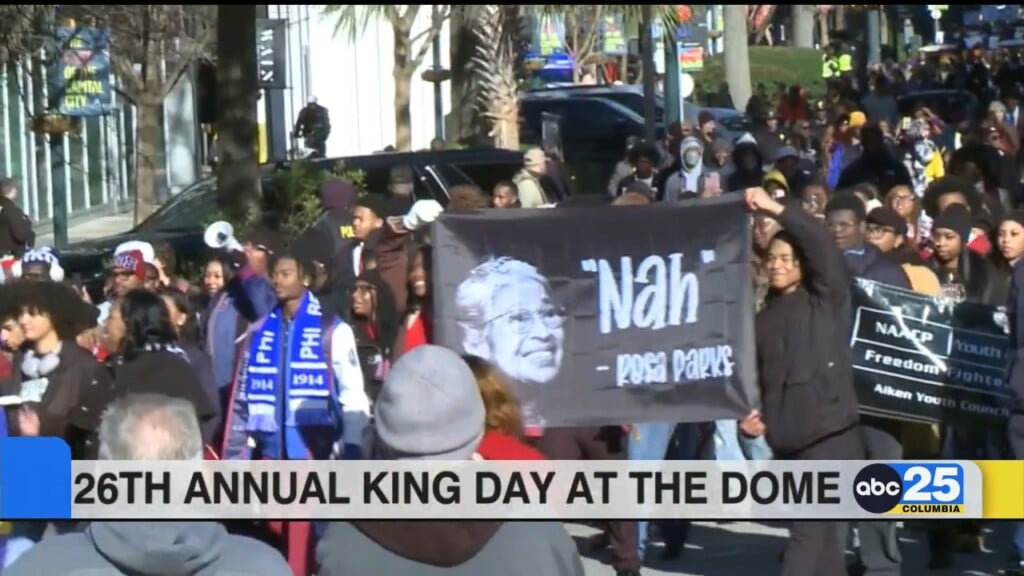Can they leave? SC domestic violence victims who share lease with abuser

FILE – Police officers are the only people seen at the South Carolina Statehouse on Jan. 20, 2021, in Columbia, S.C. The Republican-dominated South Carolina House is expected to debate a bill restricting medical care for transgender minors on Wednesday, Jan. 17, 2024. (AP Photo/Jeffrey Collins, file)
(WPDE) — South Carolina lawmakers continued debates Tuesday over how to best protect victims of domestic violence when they share a lease with their abuser.
According to the Centers for Disease Control and Prevention (CDC), “about 41 percent of women and 26 percent of men experienced contact sexual violence, physical violence, or stalking by an intimate partner during their lifetime and reported a related impact.”
For lawmakers in South Carolina, the debate has evolved from whether it’s necessary to protect these victims, but instead how.
IN THE HOUSE TUESDAY
During the South Carolina House of Representatives meeting Tuesday, Rep. Beth Bernstein (D) presented an amendment to H. 3569, a bill aiming to protect domestic violence who cosigned a lease with their perpetrator. The bill focuses on the legal complications of domestic violence victims who may be co-listed on a lease with their abuser.
“It’s an important bill. Hopefully, it’s not going to be controversial,” Bernstein said as she took the podium.
For victims cohabitating with their perpetrator in South Carolina, there are no current laws allowing them to break their lease and leave a potentially dangerous living situation without penalty. This means many victims are left living with documented abusers due to financial constraints.
In March of 2023, House members first attempted to address this issue with H. 4158. Over two years later, members are still debating how to provide legal protections without opening doors for possible harmful uses of the new legislation.
“There were several amendments on the floor last year. This bill reflects the bill that passed [overwhelmingly] out of the house chamber,” Bernstein explained.
The new version, H. 3569, takes those amendments from last year into consideration. H. 3569 was first presented to the house Jan. 14, 2025. Bernstein presented an amendment to the Bill Tuesday which adjusted the timeline for victims to enact its powers.
“The amendment just changes the timeline to make it consistent with other provisions in the bill,” Bernstein explained.
WHAT THE BILL SAID
H. 3569 defines domestic violence victims who would be eligible to break their lease as “protected tenants.” These are victims of a “qualifying incident” under the existing South Carolina legal code.
Qualifying incidents are those documented via restraining order, order of protection, or conviction of the perpetrator. The bill also requires that both the victim and the perpetrator be listed on the lease.
The amendment Bernstein presented stated that victims must provide landlords with written notice of their desire to break a lease within 60 days of the “documented” incident.
The victim must continue paying rent until the agreed termination date within those sixty days. However, after that point, the perpetrator becomes responsible for the entirety of the rent at the property.
According to this Bill, landlords would also gain the ability to end the lease for the perpetrator with “five days of written notice.”
THE 60-DAY WINDOW
The first House member to offer a question on the amendment was Rep. Robert Williams (D) who questioned why the amendment at hand extends the window to file for a lease termination from 30 to 60 days.
Bernstein explained that after debates in the House last year on the previous version of the Bill, they were attempting to offer courtesy to the landlords as well as the victims.
“We wanted to also protect the landlord in these situations… give appropriate notice,” Bernstein said.
Williams expressed concern that the 60 days may be too long for victims and open them up to potential greater harm.
“With [establishing] the order of protection, there have been several women killed during that process,” Williams said.
Bernstein replied saying that while she is aware of his concern, the Bill may not get passed if House members have concerns that it puts landlords at financial risk.
WHO HAS THE RIGHT TO END THE LEASE?
Rep. Todd Rutherford (D) brought up another concern. Because domestic abuse and violence incidents can be nuanced, they are sometimes difficult to address in court.
Rutherford, a lawyer in South Carolina for 29 years, then recalled a case of his he said happened 20 years ago.
A stay-at-home mom was attacked by her husband. While being attacked, she used a pair of scissors to defend herself and cut the man’s neck, according to Rutherford.
After the case was heard, the woman was charged with domestic violence, while the man involved was deemed the victim.
In that scenario, Rutherford pointed out, the husband would be able to leave the lease legally and place all financial responsibility on the woman who was convicted.
“She is a stay-at-home mom who has no ability to pay that lease. Now she is on the hook for the lease that the landlord can terminate, but she can’t,” Rutherford said. “She entered into it with her husband, with the full understanding that he was going to pay it, and now he’s gone.”
Rutherford argued that if the Bill grants legal authority for the landlord to terminate a lease if one or more tenant(s) are documented perpetrators, it should allow tenants the same rights.
“We’re giving rights to one party but not another?” Rutherford asked. “If the landlord can terminate, then why not give the parties that signed the lease the same powers that the landlord has?”.
Rutherford’s concerns echoed much of the conversations surrounding domestic violence laws, in that each situation is different.
Lawmakers are faced with an uphill battle in trying to create legislation that protects and serves victims without potentially putting them at risk.
LOOKING FORWARD
Tuesday marked the second reading of the Bill in the House. It is expected to face its third reading Wednesday. If House members agree on the proposed amendment and support the Bill, it will pass into the Senate.
As of June 2023, there were nine states without a statute mandating the minimum requirements for domestic or sexual violence regarding tenant rights, according to iProperty Management.
Many of the nine states listed in 2023 have since enacted legal protections for victims. In South Carolina, the future of H. 3569 may determine the rights of domestic violence victims living in fear.


